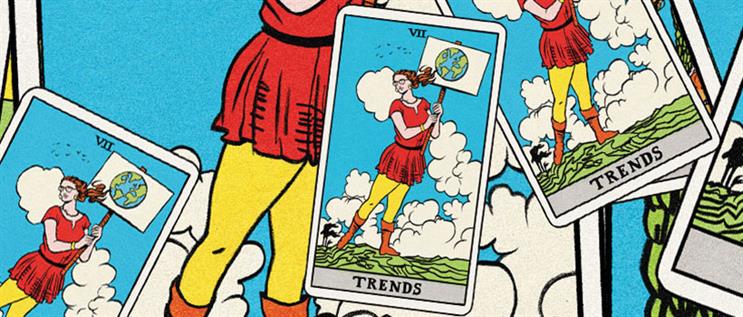'In 2021, work-from-home-forever realities will set in'
By Emma Chiu, global director,┬ĀWunderman Thompson Intelligence┬Ā
In a hurry to kiss 2020 goodbye? YouŌĆÖre not the only one. But rather than dwell on the obvious downsides, the global pandemic has also positively shaped new normal behaviours and accelerated much-needed industry changes.┬Ā
Homes have transformed into work empires; health is now a priority for all businesses; and peopleŌĆÖs increasingly ethical values are prompting brands to do better. Brands and marketers need to step up and help build a better future for all.
In 2021, work-from-home-forever realities will set in, as companies including Facebook, Twitter and Square are officially giving employees the option to work from home permanently. This shift has led Facebook to seek a director of remote work, to help ŌĆ£drive a company-wide shift towards remote-first workingŌĆØ. Expect to see more career opportunities that better facilitate remote work environments.
WeŌĆÖll also be moving into an era of work from anywhere, as countries open up their borders for foreign nationals to obtain one-year visas. Barbados, Bermuda, Dubai, Georgia and Estonia are some destinations already changing their tourism strategies. The weekend getaways may not be making a comeback anytime soon, but the more considered and extended workcations will be highly attractive for those seeking an escape. After all, why work from home when you can work from Barbados?
The pandemic has also pushed brands into the business of promoting public health, with many of them incorporating health-related products into their portfolios.┬Ā
Salons and spas, for example, are increasingly replicating the doctorŌĆÖs office as their health offerings now expand beyond DNA analysis and fertility tracking to Covid-19 testing.┬Ā
Carmakers are building in advanced air-filtration systems ŌĆō Volvo and Lincoln announced they will do so for their 2021 models.┬Ā
Or take SamsungŌĆÖs smart closet, AirDresser, which was marketed as a convenient at-home dry-cleaner when it debuted in 2018. It has since reprioritised its messaging for the post-pandemic consumer to promote its viral-killing capabilities instead.┬Ā
Health is becoming a necessary part of business and product development. It would not be surprising to see brands eventually employing their own chief health officer or health therapists to further establish their expertise in the health sector.
This year has put brands in the spotlight, as people reassess their purpose and values. The notion of what a brand represents has been steadily evolving, as the younger generation push for change. In the wake of Covid-19, 78% of US Gen Z-ers believe brands have a responsibility to help build a better normal, according to an October survey by Wunderman Thompson Intelligence. The survey also found 82% of them believe brands should be about something more than profit, and 80% believe brands should help make peopleŌĆÖs lives better.┬Ā
These demands will bring about a new value system where a brandŌĆÖs credibility will be measured by their ethical contributions, thereby allowing people to purchase purposefully. The website DidTheyHelp.com launched in 2020 providing an easy scoreboard to review companies and public figures.┬Ā
What will 2021 entail? Better values, ethics, flexibility and companies that are taking action to improve our lives, society and the future.
'Perhaps the most significant shift will be from "we" to "me"'
By Grace Wallace and Marie Conley, senior planner and head of planning, TBWA\London
Another year, another trends forecast. After fires, floods, plague and riots, it would be a crime to see the usual suspects on the 2021 list of consumer trends. Especially as only 9% of Britons want life to return to ŌĆ£normalŌĆØ (source: YouGov). So, as we emerge from the smouldering mess of the conjoined environmental, health, economic and social crises, we are confronted with what mammoth paradigm shift will come out of the crucible that was 2020.
Perhaps the most significant shift will be from ŌĆ£weŌĆØ to ŌĆ£meŌĆØ. Brexit, social distancing, WFH, online shopping, even self-care. These are all individual pursuits. My country first, my neighbourhood first, my family first, myself first. ┬Ā
As 2020 was a year of such coming together, such global rallying of community in the name of survival, 2021 may usher in the beginning of a counter-trend to this riotous togetherness. Emotionally exhausted from collective efforts, coupled with the reality of 12 months of pandemic life setting in and no definitive end in sight, the 2021 clap for carers may be reduced to patting ourselves on the back. With MattelŌĆÖs new Wellness Barbie teaching our children the benefits of self-care and many prepared to pay a premium for quiet Uber rides, is it any wonder that looking after you and your own might become the new norm?┬Ā
The role of brands may well be to curtail this ŌĆ£meŌĆØ obsession, or rather channel their power to rebalance the scales and make looking out for each other the new status symbol. Adidas tipping its hat to Nike. Burger King urging punters to have a Big Mac. These moments of togetherness would have been unimaginable once. In a post-pandemic world, however, brands need to move past the patronising applause and superficial ŌĆ£letŌĆÖs be friendsŌĆØ, and move to a place of post-togetherness. They should recognise that self-care could dominate 2021, and thus take up the mantle of forging ties with new urgency.
WeŌĆÖre talking about conjuring a paradigm shift from corporate social responsibility to personal social responsibility ŌĆō our 2021 version of post-war self-sacrifice. Shake off ŌĆ£cancel-cultureŌĆØ, and champion ŌĆ£solidarity-cultureŌĆØ. ItŌĆÖll be about celebrating self-made team spirit. DonŌĆÖt scoff. ThatŌĆÖs what getting a vaccine shot is about, and supporting black-owned businesses and driving an electric car. It will be a post-crisis, social revolution activated in our living rooms. Self-made team spirit ŌĆō so on-trend for 2021.
Illustration: Ben Jennings


